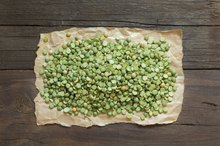Can Tomatoes Raise Blood Sugar in Diabetics?
If you are have diabetes, attaining near-normal blood sugars is a goal of therapy. Diet is an essential component of blood sugar management, so it’s important to learn how specific foods affect your numbers. A food’s carbohydrate content is closely linked to its blood sugar impact, and many vegetables -- including tomatoes -- are low enough in carbohydrates that they can be enjoyed without too much concern about portions. However, certain tomato products may have a more pronounced blood sugar impact.
Carbohydrate and Diabetes
Controlling your carbohydrate intake is a cornerstone of diabetes management, and carbohydrate counting is a common approach to diabetes meal planning. Fortunately, whole tomatoes are fairly low in carbohydrates, and for most people this means tomatoes have a minimal impact on blood sugars.
Carbohydrates in Tomatoes
Can Diabetics Eat Rye Bread & Pumpernickel Bread?
Learn More
One medium tomato contains about 5 grams of carbohydrates, and 1 cup of diced raw tomato contains about 7 grams of carbohydrates. This is similar to the levels found in most vegetables and much lower than the carbohydrates naturally found in bread, pasta, fruit, and starchy vegetables such as potatoes or corn. Some people with diabetes tolerate carbohydrates well enough to eat tomatoes and other low carbohydrate vegetables freely with no blood sugar impact. Others may need to factor the carbohydrate grams from tomatoes into their plan, particularly if large portions are consumed or if insulin needs to be dosed according to carbohydrate grams. Either way, tomatoes are nutritious and fairly low in carbohydrates, making this vegetable an easy food to fit into the diabetes meal plan.
- One medium tomato contains about 5 grams of carbohydrates, and 1 cup of diced raw tomato contains about 7 grams of carbohydrates.
- Either way, tomatoes are nutritious and fairly low in carbohydrates, making this vegetable an easy food to fit into the diabetes meal plan.
Tomato Nutrition
Although some may argue that tomatoes are a fruit, in diabetes meal planning, tomatoes are categorized as a vegetable. Like most vegetables, tomatoes are low in calories and a good source of fiber. Tomatoes are also a good source of potassium, manganese, vitamin C, vitamin K and lycopene -- a plant chemical known for its antioxidant properties. According to a review in the November 2011 issue of “Hospital Nutrition,” lycopene is theorized to curtail oxidative damage caused by body processes -- damage that can impair insulin production and action in the body 1. However, there is no solid evidence that lycopene reduces the risk of diabetes or improves blood sugar control.
- Although some may argue that tomatoes are a fruit, in diabetes meal planning, tomatoes are categorized as a vegetable.
- However, there is no solid evidence that lycopene reduces the risk of diabetes or improves blood sugar control.
Form Matters
How Many Grams of Sugar Per Day Can a Diabetic Have?
Learn More
Certain forms of tomatoes are more concentrated in carbohydrates, so more planning is needed to fit these foods into your plan. Tomato juice contains 10 grams of carbohydrate per 8 ounces or 1 cup, while tomato sauce has 14 grams of carbohydrate per 8 ounces. Finally, spaghetti or marinara sauce has about 35 grams of carbohydrate per cup -- not including the pasta it flavors. While these tomato products are very good sources of lycopene and other nutrients, the carbohydrate count of these foods needs to be factored in because of the potential blood sugar impact.
- Certain forms of tomatoes are more concentrated in carbohydrates, so more planning is needed to fit these foods into your plan.
Eating moderate amounts of carbohydrates at meals and snacks is an important step to better blood sugar control. Nutritious, whole tomatoes are low in carbohydrates and most people can easily fit this food into their diabetes meal plan. Processed tomato products contain more carbohydrates and need to be factored into the carbohydrate targets in your meal plan. If you need more education on meal planning, or need to learn your carbohydrate targets, ask for a referral to a dietitian. For many people, medications are also need to help control blood sugar levels, so if your blood sugars are not well controlled despite your efforts with diet and exercise, see your doctor or diabetes care team for guidance.
Reviewed by: Kay Peck, MPH, RD
- Eating moderate amounts of carbohydrates at meals and snacks is an important step to better blood sugar control.
- Nutritious, whole tomatoes are low in carbohydrates and most people can easily fit this food into their diabetes meal plan.
Related Articles
References
- Hospital Nutrition: Meta-Analysis of the Role of Lycopene in Type 2 Diabetes Mellitus
- Advances in Nutrition: Health Benefits of Fruits and Vegetables
- Diabetes Care: Nutrition Therapy Recommendations for the Management of Adults With Diabetes
- Tomatoes, red, ripe, raw, year round average. FoodData Central. U.S. Department of Agriculture. Published April 1, 2019.
- Chen P, Zhang W, Wang X, et al. Lycopene and risk of prostate cancer: A systematic review and meta-analysis. Medicine (Baltimore). 2015;94(33):e1260. doi:10.1097/MD.0000000000001260
- Story EN, Kopec RE, Schwartz SJ, Harris GK. An update on the health effects of tomato lycopene. Annu Rev Food Sci Technol. 2010;1:189-210. doi:10.1146/annurev.food.102308.124120
- Mozos I, Stoian D, Caraba A, Malainer C, Horbańczuk JO, Atanasov AG. Lycopene and vascular health. Front Pharmacol. 2018;9:521. doi:10.3389/fphar.2018.00521
- Vitamin A fact sheet for health professionals. Institutes of Health. Office of Dietary Supplements. Updated 2020.
- Groten K, Marini A, Grether-Beck S, et al. Tomato phytonutrients balance UV response: Results from a double-blind, randomized, placebo-controlled study. Skin Pharmacol Physiol. 2019;32(2):101-108. doi:10.1159/000497104
- Saleem A. Banihani (2018) Tomato (Solanum lycopersicum L.) and type 2 diabetes. International Journal of Food Properties. 21;(1):99-105. doi:10.1080/10942912.2018.1439959
- Oral allergy syndrome. American College of Allergy, Asthma, and Immunology. Updated 2019.
- Diet and gastroesophageal reflux disease. American Society For Gastrointestinal Endoscopy. Updated 2014.
- Tomato. University of Illinois Extension. Watch Your Garden Grow. Updated 2020.
- Zhang B, Tieman DM, Jiao C, et al. Chilling-induced tomato flavor loss is associated with altered volatile synthesis and transient changes in DNA methylation. Proc Natl Acad Sci USA. 2016;113(44):12580-12585. doi:10.1073/pnas.1613910113
Resources
Writer Bio
Aglaee Jacob is a registered dietitian. She has experience working with people who have diabetes, cardiovascular disease, hypertension and obesity issues. Jacob obtained a bachelor of science and a master of science, both in nutrition, from Laval University in Quebec City, Canada.









